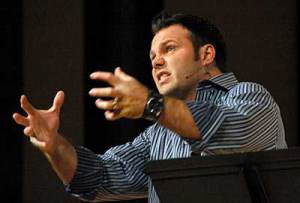We’re going to talk about Mark Driscoll today on the blog.
I know that, for many, the mere mention of that name brings up feelings of anger and overall yucky-ness. So, I’m going to help you get through it. Inspired by the “Bunnies to Replace Mark Driscoll” movement, every time your brain imagines this…:
…I want you to mentally replace that image with this:
Got it? Okay, now for the post!
If I wrote a response about everything awful or stupid Pastor Mark Driscoll (hereafter known as VoldeMark, courtesy of Dianna Anderson) said/did, I would have enough material to write about him everyday. My little brain and heart cannot handle that. Also, I know I could easily fall into the trap of hating on VoldeMark just because he’s easy to hate on. Sure my blog views would go up, but my happiness would go down.
So, I pick my battles.
When I read Matthew Paul Turner’s recent posts (found here and here) about church discipline in VoldeMark’s church, though, I knew it was time to pick up my magic wand.
These posts talk about a man named Andrew, who, while in attendance at Mark Driscoll’s Mars Hill Church, make a terrible mistake and, realizing his mistake, repentantly sought help from the leaders of the church. You can read the full story on Matthew Paul Turner’s site, but long story short, the leaders of the church presented Andrew with some ridiculous, controlling and voyeuristic conditions that he had to agree to (in the form of a contract that he had to sign) before they would accept his repentance. When Andrew refused to sign the contract, and instead decided to leave the church, his sin was made public (completely ignoring the fact that he had repented and sought help) to the rest of the church, and the rest of the church were forbidden from spending time with Andrew unless it was to address his sin.
Go read the rest of the story if you want to know the details and see the documentation. Then, come back here for a fluffy bunny break. You’re gonna need it:

Sometimes I see stories about Mars Hill and VoldeMark as an over-the-top parody of all the things that are wrong with the church. Many churches handle situations like Andrew’s terribly, but in a much more subtle manner. Mars Hill, however, throws all subtlety out the window in an almost terrifying manner.
But this abuse of power and manipulation doesn’t just take place at Mars Hill.
In fact, my reaction to this story was not one of shock, but one of familiarity.
I’m familiar with Andrew’s story because I’ve seen it take place many times, albeit on a much less obvious/well documented level, especially at the Christian schools I’ve attended.
It’s called spiritual abuse.
Leaders in church settings, be they pastors or Sunday School teachers or Christian school administrators/teachers, are often thought of as beacons of light. People often feel safe with these leaders–like they can go to these leaders for advice, tell them anything, and receive encouragement and counseling.
But sometimes those in power abuse this perception. Sometimes these leaders take advantage of people’s comfortability with them. Sometimes these leaders set out the bait of a “safe space,” and people take this bait, only to find themselves caught in a trap set by power-hungry authoritarians.
I recall my Christian highschool, which had no counseling program. Just teachers and an administration who felt that everything from self-injury to sexual sin was grounds for punishment. Who abused their power to drag confessions out of people. Who felt that the school’s reputation was more important than the well-being of the students who attended there. Who turned away those most in need of help. Who, though much less obviously than Mars Hill’s leaders, encouraged those of us in good-standing to avoid close friendships with those who had “turned away.”
And not only were there no “safe-spaces” among the administration, but many of the leaders expanded their desire for control to the personal lives of the students–expelling students for things that they posted on their social networking sites (I remember the administration calling people down to the office, and asking students to sign in to their own private Myspace pages so that the administration could look at them), and even confiscating their phones and reading their text messages. Chapel sermons sometimes stressed the importance of telling on your friends, “for their own good,” so not even private conversations with your best friend really felt safe.
Phew. I need another bunny break, don’t you?:
I survived my highschool years by withdrawing from the world. By pretending to be the perfect Christian. By covering my self-injury scars rather than asking for help. By staying with my abusive ex-boyfriend who had manipulated me into sleeping with him, rather than asking for support when I tried to leave him.
I just acted perfect.
And because I’d been so brainwashed, I thought that was normal. I thought that’s what we were supposed to do. Forget confessing our sins to one another. Forget bearing one another’s burdens.
Flush your own shit.
Wash your dirty laundry in secret.
Stay in the closet.
Hide, hide, hide.
Brothers and sisters, these things ought not so to be.
I’m not sure how to end this on a positive note. Perhaps I’ll think of something tomorrow. But here’s one last fluffy bunny:













